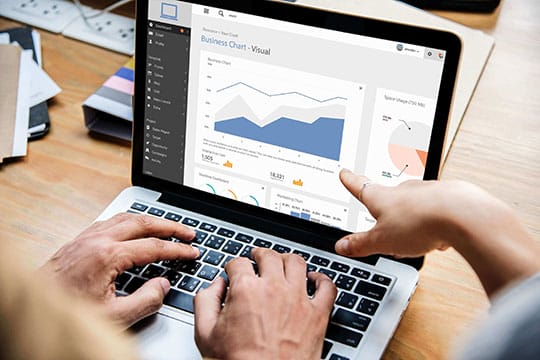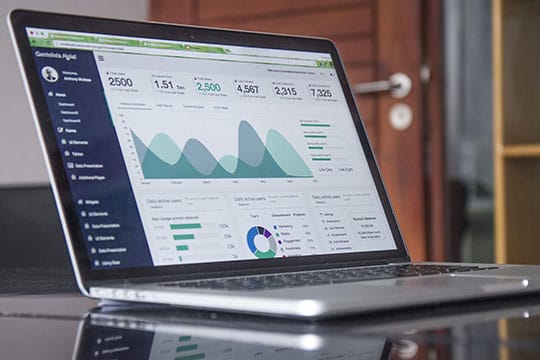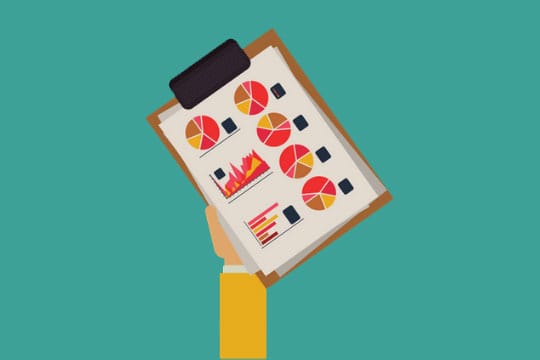Gone are the days when accounting and financial tasks were limited to paper-based general ledger entries. Every accounting professional and business owner these days is focusing on getting more clients, expanding their business, reducing menial data entry tasks, reducing errors, and gaining deeper insights into their data. The best way to do all this in the digital age is by using accounting software. An accounting software solution helps increase the business efficiency and productivity of your team by generating sales forecasts for the next quarter, determining the most and least profitable services, and more.
Importance of Accounting Software:

- Accelerates Your Work Speed: Using accounting software can increase your overall business productivity since your team would have far less paperwork to do. Automatically generated business reports and invoices save time that you can devote to get new clients.
- Saves Time: Accounting tasks are all about accurate calculations. Having a good accounting software can speed up the bookkeeping process by automating the menial tasks. Not only it saves time but reduces the potential errors that may have occurred if you used the old-style pen and paper bookkeeping techniques.
- Provides Analysis: Having good accounting software gives you an analysis of how your business would look like in a few years by providing quarterly forecasts and cash flow statements. Accounting software can help you make better financial decisions by investing in the areas that are driving profits for your business.
- Data Security: The security of critical information should be a companies’ utmost priority. In the world where cybercrime is at a rise, investing in the right accounting software can add additional layers of security to safeguard your financial data. The software offers features such as multi-factor authentication, limited user access to information, and antivirus protection to keep your information secure.
- Centralized Management: Another feature of accounting software is that it offers a centralized dashboard. You can easily view all aspects of your financial processes, including invoices, payrolls, taxes, inventory, sales orders, and more at one place that can help you save time and make quick decisions.
Recommended for you: 10 Video Editing Software to Use from Beginners to Professionals.
Tips to choose the right accounting software:

However, there are plenty of accounting software solutions out there proclaiming to be the best in the market. So, how do you choose the right software for your business requirements?
Considering these tips while picking an accounting software for your business might help:
1. Understand Your Business
 The most vital step before choosing accounting software is to understand your business requirements. Identify if you will require any industry-specific feature for your business and select the software that offers the same.
The most vital step before choosing accounting software is to understand your business requirements. Identify if you will require any industry-specific feature for your business and select the software that offers the same.
Also, check what add-on applications you need and if they integrate with your accounting solution.
Most small businesses can do with accounting software that offers basic features such as invoicing, expense tracking, report generation, and more. However, if you need advanced functionalities like inventory tracking and sale forecast, you will have to pick the software accordingly.
2. Online or Offline
 While some businesses are taking advantage of the cloud-based accounting tools that took over the market in recent years, some organizations still prefer desktop software for their financial requirements.
While some businesses are taking advantage of the cloud-based accounting tools that took over the market in recent years, some organizations still prefer desktop software for their financial requirements.
Moreover, the businesses that want both the functionalities of the desktop software and cloud features opt for cloud hosting services. For example, the cloud-based QuickBooks Enterprise with hosting software not only offers the same features and user interface as desktop software but also remote accessibility similar to QuickBooks Online (SaaS version of QuickBooks).
While choosing the most suitable model for your business, you need to undertake a proper analysis. It would be best if you explored all the options by keeping both the managerial and financial needs of your business in mind.
For that matter, you can also take help from a financial expert or your accountant.
3. User-Interface
 Since most business owners do not have an accounting background, the software should be easy to use. A clean interface with proper instructions to log in and browse the features can ease up the accounting processes for your team.
Since most business owners do not have an accounting background, the software should be easy to use. A clean interface with proper instructions to log in and browse the features can ease up the accounting processes for your team.
Because in the end, it all depends on how comfortable the interface of the software is for you and your teammates to work on without spending much on the training costs.
Moreover, managing your books will be a cakewalk if there are free online tutorials available to learn the advanced features of your accounting software.
4. Plan Your Budget
 Accounting software solutions vary depending upon the features and the pricing plans they offer. You can either purchase annual subscription plans, a package for multiple years, use a free version of the software if available, or lease the accounting software based on your firms’ budget.
Accounting software solutions vary depending upon the features and the pricing plans they offer. You can either purchase annual subscription plans, a package for multiple years, use a free version of the software if available, or lease the accounting software based on your firms’ budget.
It is often seen that expensive accounting software offers advanced functionality. It includes project reporting, expense tracking, assisted payroll, CRM Connector, and much more.
While purchasing your accounting software, make sure you are not paying for additional features that you wouldn’t require.
5. Usability of the Software
 Another factor to consider before purchasing the accounting software is whether it supports the number of users you require to work on the application. Or whether if it allows you to work on-the-go, and on any device?
Another factor to consider before purchasing the accounting software is whether it supports the number of users you require to work on the application. Or whether if it allows you to work on-the-go, and on any device?
If you choose a cloud-based software, it will help you work efficiently from anywhere, at any time, and on any device via the Internet.
There is numerous software available in the market catering from single user to up to 40 users. For enterprise businesses, choosing software that supports maximum users would be beneficial. But, a start-up can begin its accounting journey with a 1-user version.

You may like: Review of Bitdefender Small Office Security Software for Small Business.
6. Consult your Team
 Every business is different, and your accountant might be able to offer you the most educated opinion of the accounting software as per your organizational needs. They’ve worked on almost all kinds of accounting software. They know exactly what type of business you have and what software you need.
Every business is different, and your accountant might be able to offer you the most educated opinion of the accounting software as per your organizational needs. They’ve worked on almost all kinds of accounting software. They know exactly what type of business you have and what software you need.
Other than that, understand the hardware specifications required by your accounting software and consult your IT department. It is essential to review the storage space, server resources, and other components to ensure optimal business operations.
7. Explore all Options
 With numerous accounting software available in the market, it’s essential to browse all the options before investing in the software that will be the best fit for your accounting organization.
With numerous accounting software available in the market, it’s essential to browse all the options before investing in the software that will be the best fit for your accounting organization.
Among some of the most popular software in the market are Intuit QuickBooks, Xero, FreshBooks, Kashoo, Sage, Wave, GoDaddy Bookkeeping, Accounting Seed, and Zoho Books.
Some of them are in demand because of their accuracy, speed, and convenience. Others are cost-efficient and easy to use.
8. Take a Trial
 Before purchasing any accounting software, take a trial of the accounting application. You can enter dummy transactions, create invoices, generate reports, and test all the functionalities that you might require.
Before purchasing any accounting software, take a trial of the accounting application. You can enter dummy transactions, create invoices, generate reports, and test all the functionalities that you might require.
Also, you can contact the customer support and clear all queries related to your business during the trial. If everything goes in accordance with your business, you can then proceed to purchase the software.
9. Add-On Integrations
 Every accounting software, no matter how powerful it is, will need some add-on integrations to keep all the business processes running smoothly. Thus, the accounting software must integrate core functionalities like ERP, CRM, billing, HR, and more to work in coordination with accounting.
Every accounting software, no matter how powerful it is, will need some add-on integrations to keep all the business processes running smoothly. Thus, the accounting software must integrate core functionalities like ERP, CRM, billing, HR, and more to work in coordination with accounting.
For instance, apps like TSheets and Bill.com integrate with popular accounting software such as QuickBooks. However, not all software offers the capability to incorporate add-ons. Hence, it is recommended that you keep these factors in mind before finalizing the software.
10. Customer Support
 If you’re new to using accounting software, there might be a lot of functionalities that you’d like to understand for better optimization of your financial processes.
If you’re new to using accounting software, there might be a lot of functionalities that you’d like to understand for better optimization of your financial processes.
Therefore, good accounting software must always offer expert support to help you and your teammates with all your queries related to your software.
On the other hand, if your business expands and your data becomes more complex, you’ll need external guidance to help you keep your records accurate. Hence, look for software that offers around the clock customer support via phone, chat, or email.
11. Customer Reviews
 In the technology-driven world, any software recommendations that you could get online can help you choose the right software. So, once you have shortlisted the software that you think is right for your organization, look for customer reviews on various forums and websites.
In the technology-driven world, any software recommendations that you could get online can help you choose the right software. So, once you have shortlisted the software that you think is right for your organization, look for customer reviews on various forums and websites.
Depending on the various parameters, including customer support, pricing, security, functionalities, and more, you can make a better decision about your accounting software.
You may also like: Should You Opt for Antivirus Software or a VPN? Let’s Find Out!
Wrapping Up

Not having the right tools and software increases the risks of stress and burnouts in employees. The more stressed your workforce is, the more your business will suffer.
Accounting software has been helping businesses manage their books for a very long time. Some aim to enhance brand visibility while others promise to boost customer experience.
Though it can be overwhelming to choose the accounting software keeping all these factors in mind. But, since it’s going to be a one-time investment for your business, you should clear your head and take your time before you come to a decision.
Picking the right software will reduce all your stress as your employees will be more knowledgeable and feel more appreciated. This will lead to the constant growth of your business and increase company revenue.
So, choose wisely!
This article is written by Sharad Acharya. Sharad is a technical writer at Ace Cloud Hosting. He loves to research the latest technologies and has written articles on the cloud, virtualization, and security. You can follow him on Facebook, Twitter, and LinkedIn.





